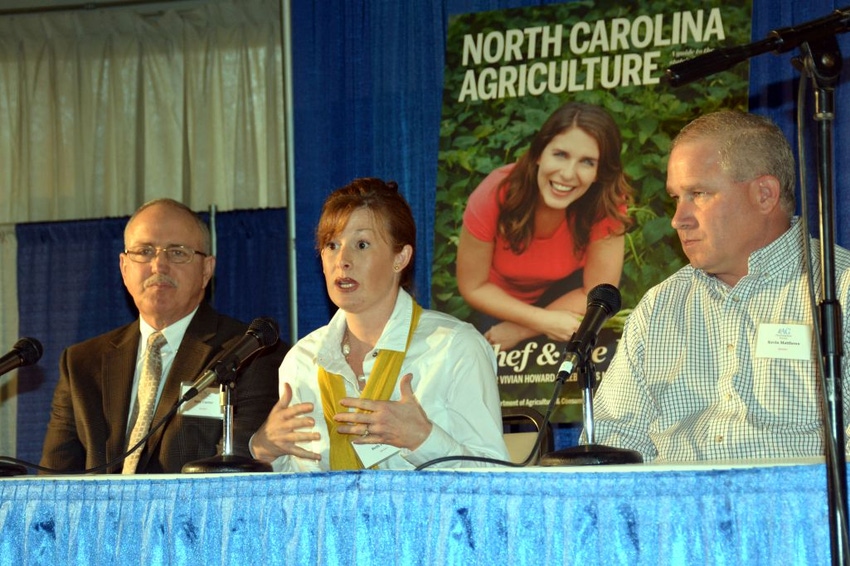
North Carolina farmers discuss job's challenging rewards
In a lively panel discussion “Farm Families: Preparing for the Future” at this year’s Agricultural Development Forum held during the Southern Farm Show in Raleigh Feb. 4, three North Carolina farmers discussed the challenges they face on the farm.

In a lively panel discussion “Farm Families: Preparing for the Future” at the Agricultural Development Forum held during the Southern Farm Show in Raleigh Feb. 4, three North Carolina farmers discussed the challenges they face on the farm.
Panelists Kevin Matthews of Yadkin County, Billy Carter of Moore County and Beth Foster of Washington County all agreed that a key to handling the challenges is to be involved in commodity groups and farm organizations such as Farm Bureau. They say farmers must be involved in shaping public policy and through it all they must focus on faith and family.
All three hope their children will return to the farm if that’s what they want to do. And all three are working to make sure their farms will be there for their children if they choose to stay on the farm.
Foster discussed the challenges of work-life balance. She farms with her father in Washington County and Tyrell County, and her husband Bryan also farms his own operation which is separate from her farm. Beth and Bryan Foster have three children, Peyton, age 12, Clara Tate, age 9 and Henry, age 3. Beth and her father farm 8,000 acres of cotton, corn, wheat and milo near Roper, N.C.
“It’s tough keeping a balance,” Foster said. “I enjoy my work, but I also have three children. You get a lot of second chances in life, but raising your children is not one of those. When it’s done, it’s done.”
Foster said commitment to the children comes first for both her and Bryan. The good thing, she stressed, is that farming allows her to bring her children to work with her on the farm. “That’s the part of farm family that I love. We can all do things together,” Foster said.
“My husband and I both take very seriously the foundation we are setting for our children. We show them how to work, but we also don’t work so much that we take away from our time with them because that time of going to the ball game or that time of going to church together is worth much more than money.”
Carter said that two of his children have expressed interest in returning to the farm. He said his primary challenge is to create a situation where that opportunity exists for them, but he doesn’t want them to forsake other opportunities. Like Foster, Carter said work-life balance is critical.
“It is something we consciously talk about as a family. We make an effort to be in church three times a week. We want to make sure our children are involved with music lessons and sports,” he said.
Matthews stressed the importance of family and his Christian faith for success on the farm. “You have to do a lot praying. It doesn’t matter if its weather or policy, you have to have faith,” he said. Matthews and wife Cindy have three children.
When it comes to public policy, all thee agreed that the Waters of the U.S. Rule finalized by the Army Corps of Engineers and the Environmental Protection Agency is their greatest regulatory challenge they face. The American Farm Bureau Federation notes that the rule poses a serious threat to farmers, ranchers and private landowners by permitting EPA to regulate well beyond limits authorized by Congress and affirmed by the Supreme Court. The rule significantly expands the scope of “navigable water” subject to Clean Water Act jurisdiction.
“This thing is dangerous,” Matthews said of the Waters of the U.S. Rule.
Because of every increasing regulation, Matthews, Carter and Foster are all active in public policy, from the county level on up to Washington, D.C. They all say it is critical to form strong working relationships with elected representatives early on.
“Be involved in organizations that speak for you,” Carter advised. “When you have an issue, be prepared to speak. The cardinal rule of being engaged with any legislative official is the first time you interact with them, don’t begin with a complaint. You need to be engaged with people prior to that,” he said.
About the Author(s)
You May Also Like





